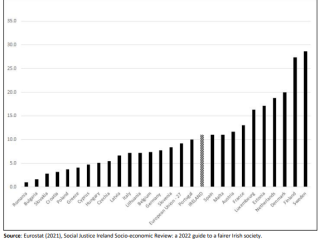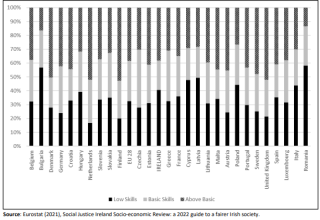Towards Wellbeing For All - Knowledge, Skills and Innovation

The Programme for Government acknowledged that our “existing measures of economic performance fail to measure matters such as damage to the environment and voluntary work. They also overlook equality of opportunity, distribution of wealth and income and only value public expenditure on the basis of the inputs used, not the outcomes achieved” and committed to introducing a series of indicators that would more accurately measure wellbeing to provide a “holistic view of how our society is faring”.
A ‘Wellbeing Dashboard’ was then developed to provide a snapshot of progress. In developing the Dashboard, the Inter-Departmental Working Group established a list of 35 indicators chosen to be balanced, add value or be of policy relevance, provide for aggregation and dis-aggregation, be readily available and of sufficient quality, and be internationally comparable.
So how are we doing? To gauge public opinion on what matters, and what should therefore be counted as an indicator of Well-being, Social Justice Ireland produced a survey asking people to rank a set of six indicators under each of the Well-being Framework dimensions from one to six, with one being the least important and six being the most important. The six indicators included the indicators used in the Dashboard and datasets readily available from the CSO and other reputable sources. This survey was circulated over the Summer months through our social media channels, our Weekly Digest, and our Members Bulletin. What follows is based on the responses to this survey and our policy proposals under each of the 11 dimensions.
Access to appropriate education and skills development from early years to adulthood is one of the key public services that enables participation in society, public life and the labour market. The potential impact of digital transition on the labour market makes access to education and training throughout adulthood a priority.
Ireland has the fourth lowest early school leaving rate in the European Union at five per cent and Ireland ranked second in the European Union for the percentage of people aged 20-24 with at least upper-second level education at 94 per cent.[1] This downward trend of early school leaving is a welcome development and Ireland has surpassed the national target set under the Europe 2020 Strategy. On lifelong learning, this has improved between 2016 and 2021 as indicated in the report, however the participation rate of 11.5 per cent in 2021 is 1.5pps below the 2019 level of 13 per cent and is 3.5pps below the national target of 15 per cent by 2025. At an EU level, Ireland ranked joint 9th with Spain and Malta (not 10th as stated in the report) (Chart 1).
Chart 1: EU-28 Lifelong Learning Participation Rates, 2020

Ireland’s performance on digital skills is concerning (Chart 2). Over 55 per cent of the population have low or basic digital skills. Over one third of the adult population (36 per cent) has low digital skills, well above the EU average (28 per cent). Only one fifth of the population have basic digital skills. This general gap in digital skills is also confirmed by the OECD PIAAC survey of adult learning. Clearly one 3 Statistical Yearbook of Ireland 2019 - CSO - Central Statistics Office implication is that expenditure on training will have to increase, especially if we are to meet our digital literacy target. Across the OECD average spending on training for the unemployed and workers at risk of involuntary unemployment is only 0.13 per cent of gross domestic product (GDP).
Chart 2: EU-28 Digital Skills Levels, 2019

Policy Priorities
- Make the improvement of educational outcomes for pupils from disadvantaged backgrounds and disadvantaged communities a policy priority, with additional resources focused on addressing the persistence of educational disadvantage.
- Commit to increasing investment in Early Childhood Care and Education by 0.1 per cent of GDP annually to reach 1 per cent of GDP by 2027.
- Commit to reducing class sizes and pupil teacher ratios at primary and post primary level by 1 point per annum to 2030.
- Revise our lifelong learning target to reach 20 per cent by 2026, ensuring sufficient resources are made available.
- To meet the digital and green transition challenges develop an integrated skills development, digital transition, vocational training, apprenticeship and reskilling strategy.
- Fully resource ‘Adult Literacy for Life’ by increasing the adult literacy budget to €100 million by 2030, including €25 million to improve ancillary and support services
[1] https://www.cso.ie/en/releasesandpublications/ep/p-syi/statisticalyearb…